The Hijab : Liberation Or Oppression ? by Dr.Gohar Mushtaq
The Hijab : Liberation Or Oppression ? by Dr.Gohar Mushtaq
Publisher:
IIPH (International Islamic Publishing House)
Author:
Dr. Gohar Mushtaq
Language:
English
Binding:
Hard Cover
Pages: 307
Size: 14x21cm
Couldn't load pickup availability
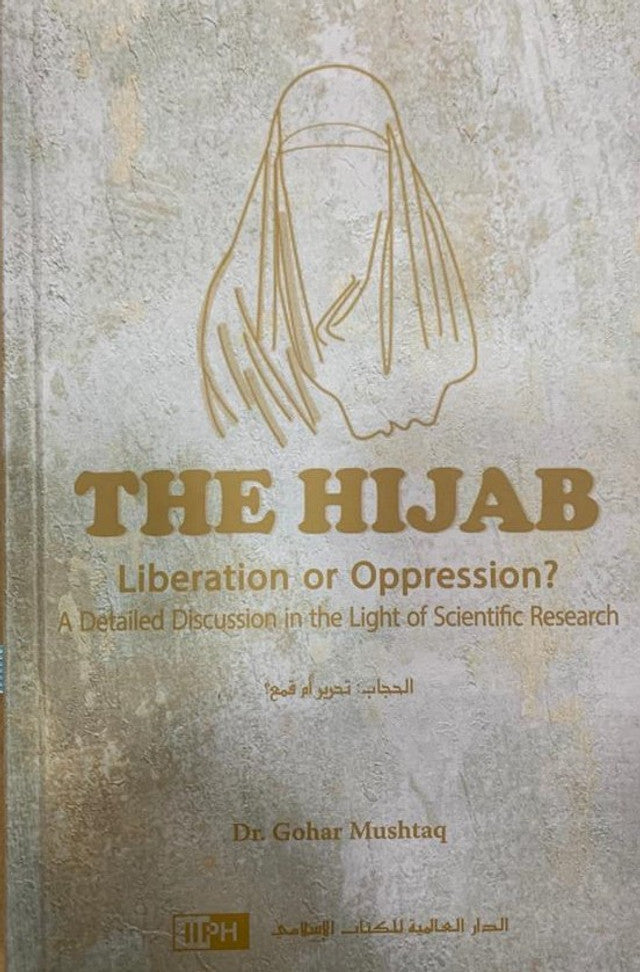
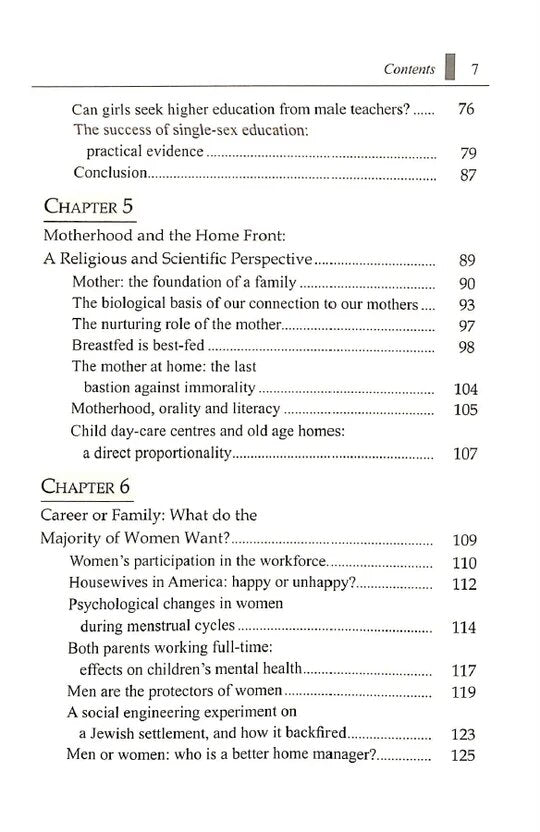
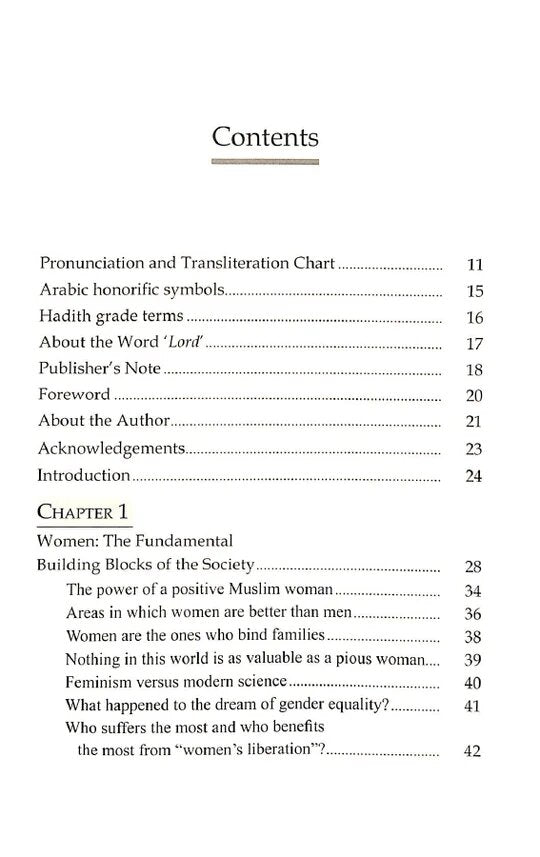
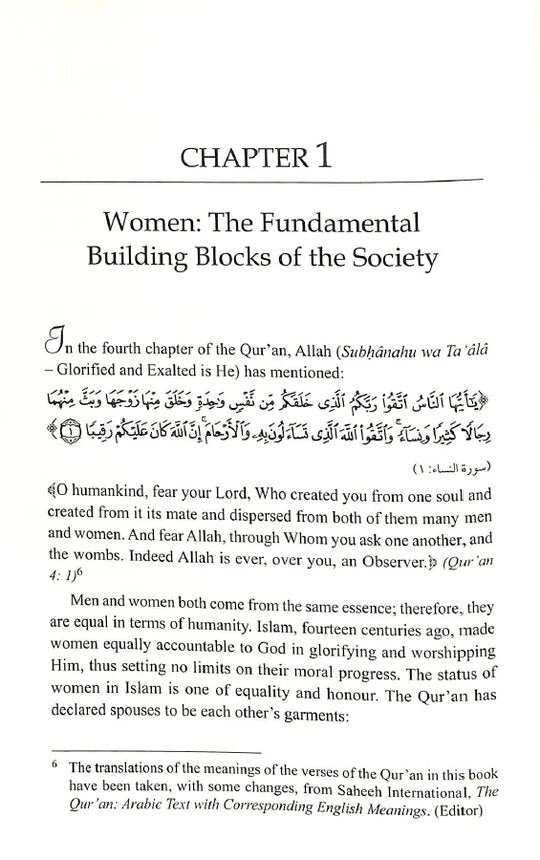
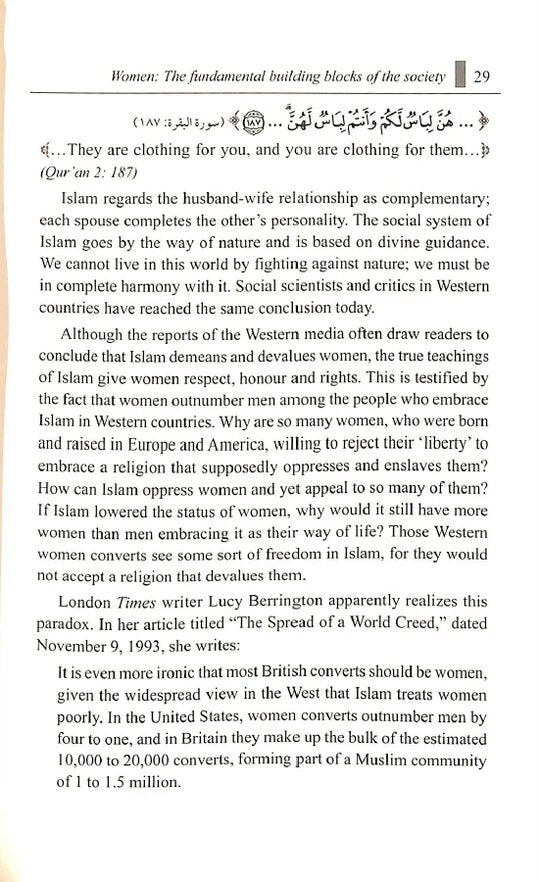
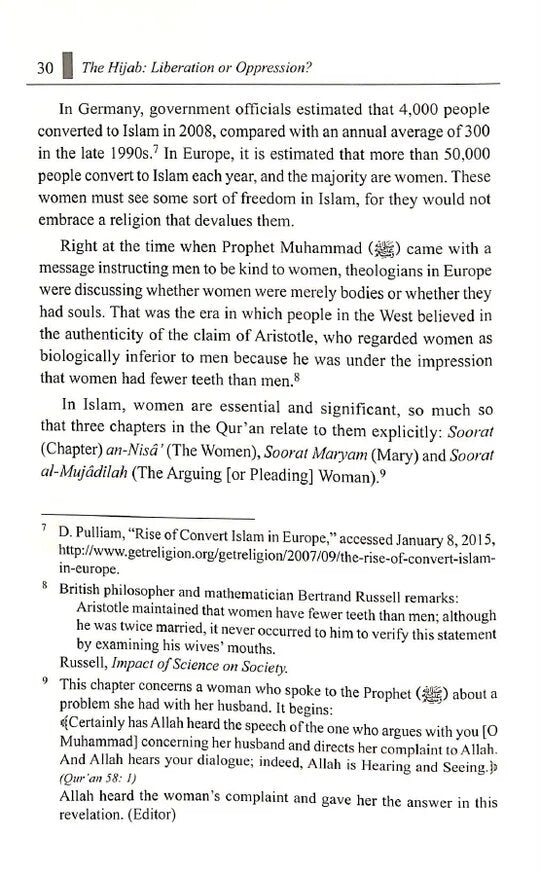
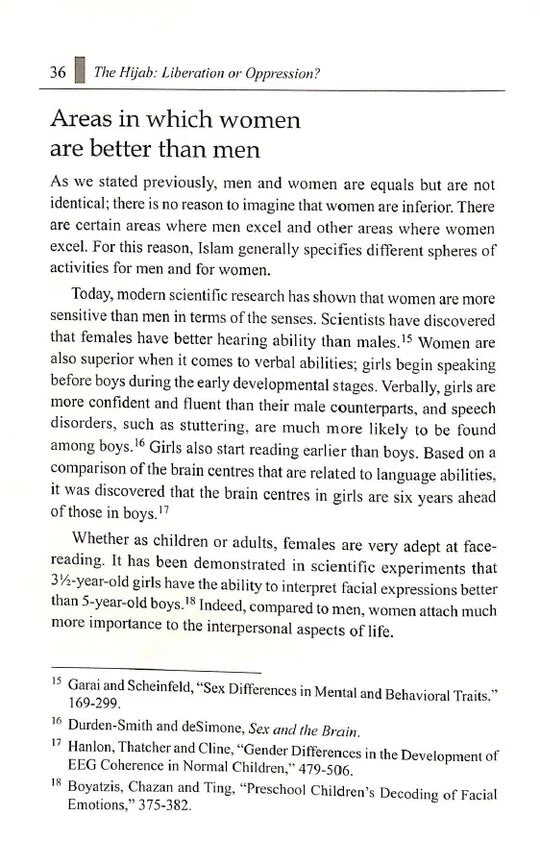
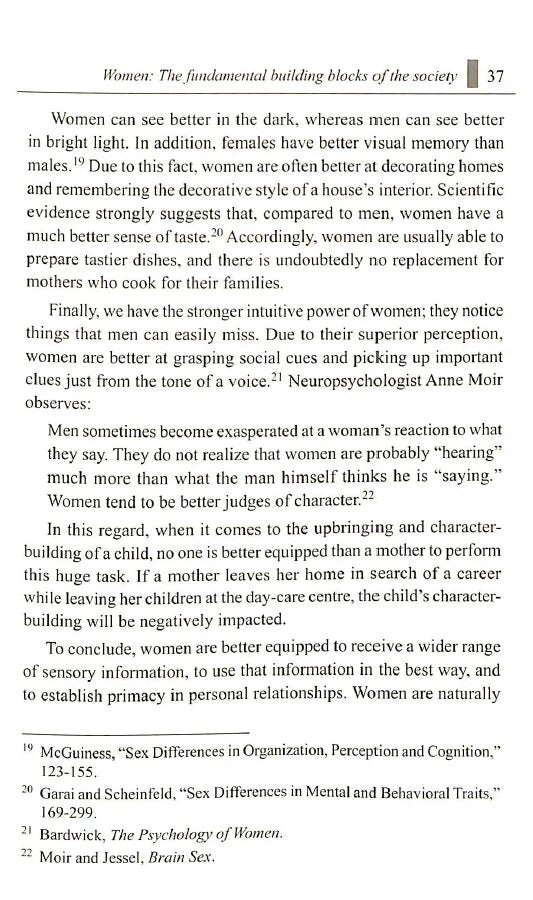
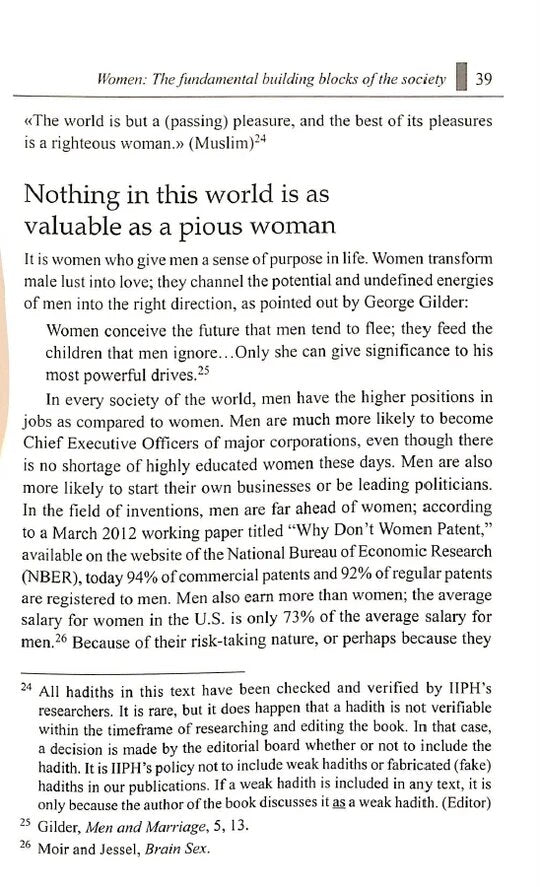
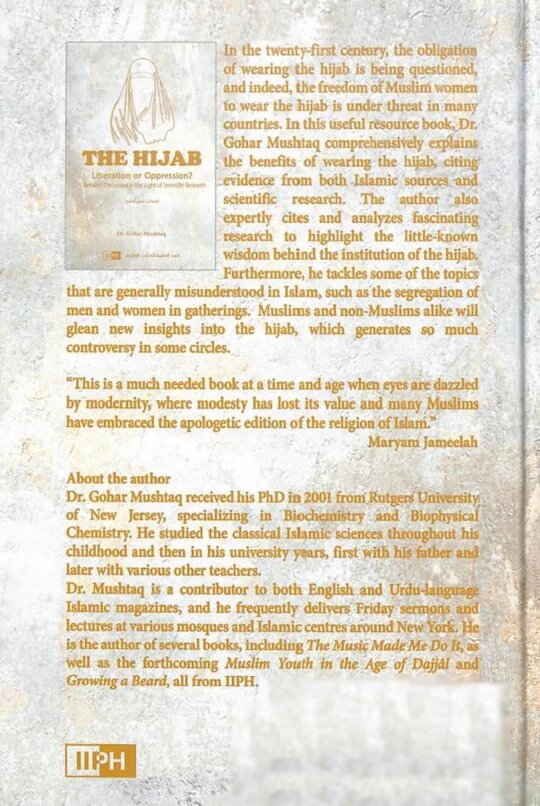
Collapsible content
Description of Book
The Hijab : Liberation Or Oppression ? by Dr. Gohar Mushtaq
The book also touches on the societal stereotypes and prejudices that Muslim women encounter when wearing the hijab, and how these experiences can shape their identities and their perceptions of freedom and oppression. Drawing from various case studies, interviews, and perspectives from both scholars and ordinary women, The Hijab: Empowerment or Oppression? encourages readers to challenge preconceived notions and engage with the subject from a place of understanding and respect.
Ultimately, this book aims to offer a balanced and insightful exploration of the hijab, allowing readers to form their own opinions on whether it represents empowerment or oppression, or if, in fact, it can simultaneously embody both. With its thoughtful approach, The Hijab: Empowerment or Oppression? is an essential read for anyone looking to gain a deeper understanding of the significance of the hijab in the lives of Muslim women today.
Publisher
IIPH (International Islamic Publishing House)
Author
- Dr. Gohar Mushtaq
Sample Pages - Content
Page01
THE HIJAB
Liberation or Oppression?
A Detailed Discussion in the Light of Scientific Research
HIPH
الحجاب: تحرير أم قمع ؟
Dr. Gohar Mushtaq
الدار العالمية للكتاب الإسلامي
Page:02
Contents
Pronunciation and Transliteration Chart.
Arabic honorific symbol...................
Hadith grade terms.......
About the Word 'Lord'.
Publisher's Note.
Foreword................
About the Author..
Acknowledgements..
Introduction..
CHAPTER 1
Women: The Fundamental
Building Blocks of the Society........
The power of a positive Muslim woman.
11
15
16
17
18
20
21
23
2222
24
28
34
36
38
39
40
41
Areas in which women are better than men.. Women are the ones who bind families......
Nothing in this world is as valuable as a pious woman.... Feminism versus modern science................
What happened to the dream of gender equality?..
Who suffers the most and who benefits
the most from "women's liberation"?.
Page:03
Contents 7
Can girls seek higher education from male teachers?. The success of single-sex education: practical evidence.........
Conclusion...........
CHAPTER 5
Motherhood and the Home Front:
76
76
668
79
87
A Religious and Scientific Perspective.......
Mother: the foundation of a family.........
89
90
The biological basis of our connection to our mothers..... 93
The nurturing role of the mother..........
97
Breastfed is best-fed.............
98
The mother at home: the last
bastion against immorality.
104
Motherhood, orality and literacy.
105
Child day-care centres and old age homes:
a direct proportionality...........
107
CHAPTER 6
Career or Family: What do the
Majority of Women Want?..
109
Women's participation in the workforce...
110
Housewives in America: happy or unhappy?..
112
Psychological changes in women
during menstrual cycles.......
114
Both parents working full-time:
effects on children's mental health..
Men are the protectors of women........
A social engineering experiment on
117
119
a Jewish settlement, and how it backfired..
123
Men or women: who is a better home manager?..............
125
Page:04
CHAPTER 1
Women: The Fundamental Building Blocks of the Society
In the fourth chapter of the Qur'an, Allah (Subhanahu wa Ta'âlâ
-Glorified and Exalted is He) has mentioned:
ريَأَيُّهَا النَّاسُ اتَّقُوا رَبَّكُمُ الَّذِى خَلَقَكُم مِّن نَّفْسٍ وَاحِدَةٍ وَخَلَقَ مِنْهَا زَوْجَهَا وَبَثَّ مِنْهُمَا
رِجَالًا كَثِيرًا وَنِسَاءً وَاتَّقُوا اللَّهَ الَّذِي تَسَاءَلُونَ بِهِ، وَالْأَرْحَامَ إِنَّ اللَّهَ كَانَ عَلَيْكُمْ رَقِيبًا
(سورة النساء: ١)
40 humankind, fear your Lord, Who created you from one soul and created from it its mate and dispersed from both of them many men and women. And fear Allah, through Whom you ask one another, and the wombs. Indeed Allah is ever, over you, an Observer.) (Qur'an
4: 16
Men and women both come from the same essence; therefore, they are equal in terms of humanity. Islam, fourteen centuries ago, made women equally accountable to God in glorifying and worshipping Him, thus setting no limits on their moral progress. The status of women in Islam is one of equality and honour. The Qur'an has declared spouses to be each other's garments:
6 The translations of the meanings of the verses of the Qur'an in this book have been taken, with some changes, from Saheeh International, The Qur'an: Arabic Text with Corresponding English Meanings. (Editor)
Page:05
Women: The fundamental building blocks of the society 29
و ... هُنَّ لِبَاسٌ لَّكُمْ وَأَنتُمْ لِبَاسُ لَّهُنَّ ... (سورة البقرة: ۱۸۷)
...They are clothing for you, and you are clothing for them...}> (Qur'an 2: 187)
Islam regards the husband-wife relationship as complementary; each spouse completes the other's personality. The social system of Islam goes by the way of nature and is based on divine guidance. We cannot live in this world by fighting against nature; we must be in complete harmony with it. Social scientists and critics in Western countries have reached the same conclusion today.
Although the reports of the Western media often draw readers to conclude that Islam demeans and devalues women, the true teachings of Islam give women respect, honour and rights. This is testified by the fact that women outnumber men among the people who embrace Islam in Western countries. Why are so many women, who were born and raised in Europe and America, willing to reject their 'liberty' to embrace a religion that supposedly oppresses and enslaves them? How can Islam oppress women and yet appeal to so many of them? If Islam lowered the status of women, why would it still have more women than men embracing it as their way of life? Those Western women converts see some sort of freedom in Islam, for they would not accept a religion that devalues them.
London Times writer Lucy Berrington apparently realizes this paradox. In her article titled "The Spread of a World Creed," dated November 9, 1993, she writes:
It is even more ironic that most British converts should be women, given the widespread view in the West that Islam treats women poorly. In the United States, women converts outnumber men by four to one, and in Britain they make up the bulk of the estimated 10,000 to 20,000 converts, forming part of a Muslim community of 1 to 1.5 million.
Page:06
30
The Hijab: Liberation or Oppression?
In Germany, government officials estimated that 4,000 people converted to Islam in 2008, compared with an annual average of 300 in the late 1990s. In Europe, it is estimated that more than 50,000 people convert to Islam each year, and the majority are women. These women must see some sort of freedom in Islam, for they would not embrace a religion that devalues them.
Right at the time when Prophet Muhammad () came with a message instructing men to be kind to women, theologians in Europe were discussing whether women were merely bodies or whether they had souls. That was the era in which people in the West believed in the authenticity of the claim of Aristotle, who regarded women as biologically inferior to men because he was under the impression that women had fewer teeth than men.8
In Islam, women are essential and significant, so much so that three chapters in the Qur'an relate to them explicitly: Soorat (Chapter) an-Nisa' (The Women), Soorat Maryam (Mary) and Soorat al-Mujadilah (The Arguing [or Pleading] Woman)."
7
D. Pulliam, "Rise of Convert Islam in Europe," accessed January 8, 2015, http://www.getreligion.org/getreligion/2007/09/the-rise-of-convert-islam-
in-europe.
8 British philosopher and mathematician Bertrand Russell remarks:
Aristotle maintained that women have fewer teeth than men; although he was twice married, it never occurred to him to verify this statement by examining his wives' mouths.
Russell, Impact of Science on Society.
"This chapter concerns a woman who spoke to the Prophet () about a problem she had with her husband. It begins:
Certainly has Allah heard the speech of the one who argues with you [O Muhammad] concerning her husband and directs her complaint to Allah. And Allah hears your dialogue; indeed, Allah is Hearing and Seeing.}> (Qur'an 58: 1)
Allah heard the woman's complaint and gave her the answer in this revelation. (Editor)
Page:07
36 The Hijab: Liberation or Oppression?
Areas in which women are better than men
As we stated previously, men and women are equals but are not identical; there is no reason to imagine that women are inferior. There are certain areas where men excel and other areas where women excel. For this reason, Islam generally specifies different spheres of activities for men and for women.
Today, modern scientific research has shown that women are more sensitive than men in terms of the senses. Scientists have discovered that females have better hearing ability than males. 15 Women are also superior when it comes to verbal abilities; girls begin speaking before boys during the early developmental stages. Verbally, girls are more confident and fluent than their male counterparts, and speech disorders, such as stuttering, are much more likely to be found among boys.16 Girls also start reading earlier than boys. Based on a comparison of the brain centres that are related to language abilities, it was discovered that the brain centres in girls are six years ahead of those in boys. 17
Whether as children or adults, females are very adept at face- reading. It has been demonstrated in scientific experiments that 31⁄2-year-old girls have the ability to interpret facial expressions better than 5-year-old boys. 18 Indeed, compared to men, women attach much more importance to the interpersonal aspects of life.
15 Garai and Scheinfeld, "Sex Differences in Mental and Behavioral Traits." 169-299.
16 Durden-Smith and deSimone, Sex and the Brain.
17 Hanlon, Thatcher and Cline, "Gender Differences in the Development of EEG Coherence in Normal Children," 479-506.
18 Boyatzis, Chazan and Ting, "Preschool Children's Decoding of Facial Emotions," 375-382.
Page:08
Women: The fundamental building blocks of the society 37
Women can see better in the dark, whereas men can see better in bright light. In addition, females have better visual memory than males. 19 Due to this fact, women are often better at decorating homes and remembering the decorative style of a house's interior. Scientific evidence strongly suggests that, compared to men, women have a much better sense of taste.20 Accordingly, women are usually able to prepare tastier dishes, and there is undoubtedly no replacement for mothers who cook for their families.
Finally, we have the stronger intuitive power of women; they notice things that men can easily miss. Due to their superior perception, women are better at grasping social cues and picking up important clues just from the tone of a voice.21 Neuropsychologist Anne Moir observes:
Men sometimes become exasperated at a woman's reaction to what they say. They do not realize that women are probably "hearing" much more than what the man himself thinks he is "saying." Women tend to be better judges of character.22
In this regard, when it comes to the upbringing and character- building of a child, no one is better equipped than a mother to perform this huge task. If a mother leaves her home in search of a career while leaving her children at the day-care centre, the child's character- building will be negatively impacted.
To conclude, women are better equipped to receive a wider range of sensory information, to use that information in the best way, and to establish primacy in personal relationships. Women are naturally
19 McGuiness, "Sex Differences in Organization, Perception and Cognition," 123-155.
20 Garai and Scheinfeld, "Sex Differences in Mental and Behavioral Traits," 169-299.
21 Bardwick, The Psychology of Women.
22 Moir and Jessel, Brain Sex.
Page:09
Women: The fundamental building blocks of the society 39
<<The world is but a (passing) pleasure, and the best of its pleasures is a righteous woman.>> (Muslim)24
Nothing in this world is as
valuable as a pious woman
It is women who give men a sense of purpose in life. Women transform male lust into love; they channel the potential and undefined energies of men into the right direction, as pointed out by George Gilder:
Women conceive the future that men tend to flee; they feed the children that men ignore... Only she can give significance to his most powerful drives.25
In every society of the world, men have the higher positions in jobs as compared to women. Men are much more likely to become Chief Executive Officers of major corporations, even though there is no shortage of highly educated women these days. Men are also more likely to start their own businesses or be leading politicians. In the field of inventions, men are far ahead of women; according to a March 2012 working paper titled "Why Don't Women Patent," available on the website of the National Bureau of Economic Research (NBER), today 94% of commercial patents and 92% of regular patents are registered to men. Men also earn more than women; the average salary for women in the U.S. is only 73% of the average salary for men.26 Because of their risk-taking nature, or perhaps because they
24 All hadiths in this text have been checked and verified by IIPH's researchers. It is rare, but it does happen that a hadith is not verifiable within the timeframe of researching and editing the book. In that case, a decision is made by the editorial board whether or not to include the hadith. It is IIPH's policy not to include weak hadiths or fabricated (fake) hadiths in our publications. If a weak hadith is included in any text, it is only because the author of the book discusses it as a weak hadith. (Editor) 25 Gilder, Men and Marriage, 5, 13.
26 Moir and Jessel, Brain Sex.
Page:10
Liberation or Oppression?
In the twenty-first century, the obligation of wearing the hijab is being questioned, and indeed, the freedom of Muslim women to wear the hijab is under threat in many countries. In this useful resource book, Dr. Gohar Mushtaq comprehensively explains
THE HIJAB the benefits of wearing the hijab, citing evidence from both Islamic sources and scientific research. The author
also
expertly cites and analyzes fascinating research to highlight the little-known wisdom behind the institution of the hijab. Furthermore, he tackles some of the topics that are generally misunderstood in Islam, such as the segregation of men and women in gatherings. Muslims and non-Muslims alike will glean new insights into the hijab, which generates so much controversy in some circles.
"This is a much needed book at a time and age when eyes are dazzled by modernity, where modesty has lost its value and many Muslims have embraced the apologetic edition of the religion of Islam." Maryam Jameelah
About the author
Dr. Gohar Mushtaq received his PhD in 2001 from Rutgers University of New Jersey, specializing in Biochemistry and Biophysical Chemistry. He studied the classical Islamic sciences throughout his childhood and then in his university years, first with his father and later with various other teachers.
Dr. Mushtaq is a contributor to both English and Urdu-language Islamic magazines, and he frequently delivers Friday sermons and lectures at various mosques and Islamic centres around New York. He is the author of several books, including The Music Made Me Do It, as well as the forthcoming Muslim Youth in the Age of Dajjal and Growing a Beard, all from IIPH.
IIPH
Who is Dr. Gohar Mushtaq?
Dr. Gohar Mushtaq is a scholar and author known for blending Islamic teachings with modern science. He earned his Bachelor's in Medical Technology from York College, USA, and later obtained his Ph.D. in Medical Biochemistry from Rutgers University.










